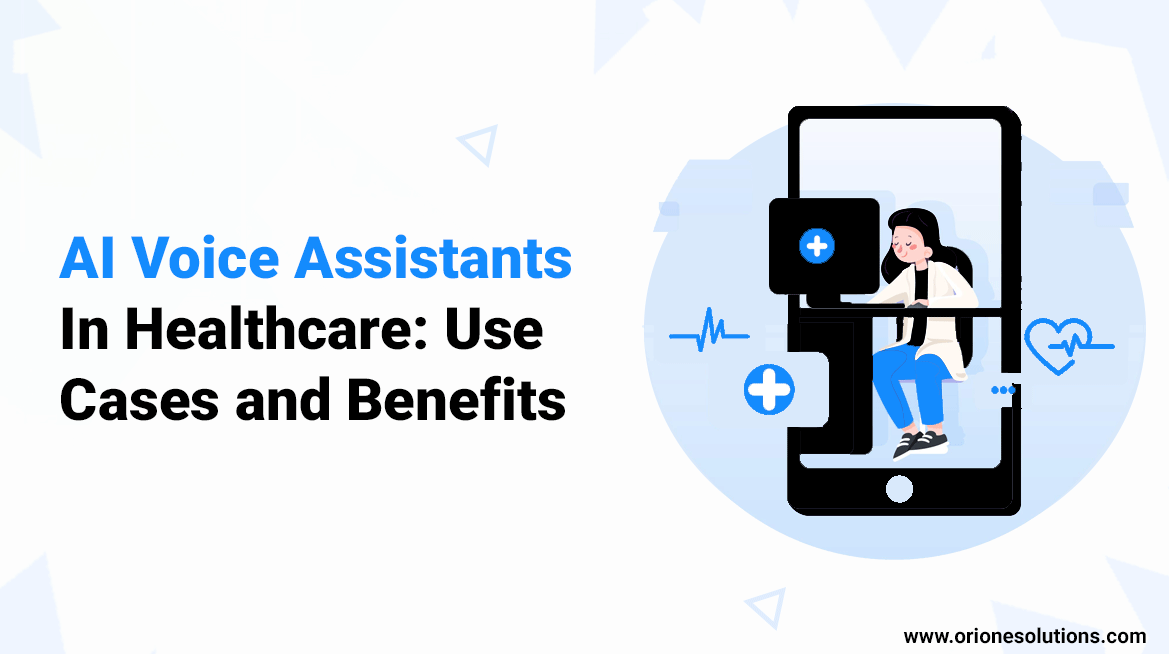What comes to your mind when talking about healthcare services? Of course, it is the patient’s frustration and long wait times. But this does not need to be the same for today’s patients.
Undoubtedly, the healthcare industry is undergoing a major digital transformation. Integrating AI-backed solutions in this sector has simplified multiple operations and opened multiple opportunities for healthcare facilities to enhance patient care and improve overall patient experiences.
According to a survey by Augnito, around 70% of healthcare establishments found voice AI beneficial in enhancing workflow and overall patient care.
This showcases the impact of voice assistants but what exactly happens and how it influences when integrated in the healthcare sector are unknown to many.
So, in this write-up, we will begin with covering the various use cases of AI voice assistants in healthcare industry followed by the benefits of integrating voice AI in healthcare.
Top Use Cases of AI Voice Assistants in Healthcare
The multiple use cases for AI voice assistants in healthcare vary depending on the needs of specific healthcare facilities. Moreover, the range of applications is expanding, making it more relevant to leverage AI to maintain operations.
Appointment Scheduling
The number of phone calls received by the healthcare staff to schedule everyday appointments is always high. Not all patients can visit the healthcare facility in person to book their appointments. Hence, this entire scheduling process becomes cumbersome while modern healthcare facilities demand simplified administrative processes.
Here, AI-backed voice assistants rule the healthcare systems by automating the appointment management task. A smart AI voice assistant can book, reschedule, or cancel the bookings, minimizing the chances of errors. Additionally, it ensures the data provided by the users is up-to-date. The patients are prompted to fill in the pending or inaccurate information. It not only results in organized healthcare establishments but also provides a smoother and responsive experience to the patients.
Patient Reminder
We have always heard and felt that ‘Time is everything.’ This is true in the case of healthcare services. Delayed medical care, missed appointments or forgotten prescriptions result in health concerns. Here, integrating voice AI can be the time savior. It can be utilized to send
personalized notifications to the patients, notifying them on calls about their scheduled appointments and continuously looking at healthcare-related events.
This leads to improved health, makes patients feel valued, enhances patient’s trust in the services, and improves overall patient satisfaction.
Patient Support
Many people suffer from chronic illnesses that require self-care and management. This, in turn, requires patients to be well-versed and informed about their condition and ways to take care of their health.
Here, leveraging natural processing algorithms, AI voice agents process large chunks of medical data, summarize it, and provide accurate and relevant information and advice to patients regarding their specific health concerns. Furthermore, it can answer multiple patient queries like symptoms, treatment options, and others regarding illnesses.
Remote Patient Monitoring
Remote monitoring of patients requires advanced technology to gather and transfer the patient’s data so that healthcare experts can monitor health concerns remotely.
Here, voice AI facilitates the process by enabling natural language conversations between the voice agents and the patients. Thus, allowing for gathering real-time data to simplify the health concern detection, enhance patient engagement, and deliver quick assistance.
Overall, voice agents enhance communication, simplify data gathering, and ensure providing more personalized and trustworthy healthcare experiences to patients.
Billing Management
Voice assistants help simplify the billing process in healthcare facilities. Such a solution notifies patients about appointment charges, if any. Also, it can utilize data from the database to address billing concerns that patients may have.
In addition, the AI voice assistants can manage payment transactions and produce required approvals for insurance agencies. Thus, the clinicians can focus on more complex and productive tasks.
Gather Patient’s Feedback
Collecting patient feedback is vital to ensure continuous improvement of healthcare services and patient satisfaction. Here, employing AI voice assistants simplifies the feedback process by automating the surveys, and gathering valuable patient insights post-services. It not only helps healthcare service providers to enhance their offerings.
Moreover, patients can provide ratings based on different parameters and voice agents can further ask follow-up queries to understand the reasons for patient satisfaction and dissatisfaction.
All in all, such data encourages healthcare service providers to deliver qualitative services. Thus, ensuring all the patient requirements are addressed quickly and efficiently.
Main Benefits of Integrating AI Voice Assistants in Healthcare
Healthcare service providers are finding AI voice assistants truly beneficial in improving efficiency and overall patient experience. Below are a few reasons why many healthcare facilities strongly believe in the competency of voice AI. Let’s discover these:
Increased Productivity
Implementing AI voice assistants in healthcare facilities contributes to increased efficiency and productivity. Thus, enabling the completion of other vital chores in the same timeframe.
24/7 Accessibility
AI voice assistants provide 24/7 services, assisting patients seeking help irrespective of time. Such easy accessibility to medical resources ensures quick guidance on customer queries, boosts patient convenience and ensures the best medical services are provided.
Reduced Administrative Costs
Voice AI and automation together contribute to reducing overall administrative expenses. Furthermore, resource utilization improves, focusing more on enhanced patient care and several other critical service areas.
Better Decision-Making
The AI-backed voice assistants provide valuable insights regarding patient feedback, engagement, and behavior patterns. Healthcare organizations can analyze data based on patient interactions, and determine the improvement areas. Thus, easing the processes like simplifying appointments, rescheduling patient visits, and helping in making more informed decisions.
Conclusion
To conclude, voice AI is a popular technology gaining huge traction among businesses, especially the healthcare industry. Our article has covered both the use cases and potential benefits of integrating AI voice assistants in a healthcare establishment. Furthermore, you can explore in-depth the role of improved patient experience, customer service, and engagement.
So, if you are looking for such a proven AI software development solution for your medical facility, VoAgents could be the right fit. With our next-gen AI voice agent, you can automate the inbound and outbound calls, ease patient appointment scheduling, and improve overall hospital process efficiency.
Frequently Asked Questions
Q1. How are AI voice assistants beneficial in Healthcare?
Answer: AI voice assistants prove to be cost-efficient in the healthcare sector and the reasons are many. It helps optimize different administrative processes like appointment scheduling, inbound and outbound calling, and more. This ensures professionals deliver the best possible patient care and reduces costs associated with the services.
Q2. What are the possible limitations of AI-backed voice agents?
Answer: One main drawback of integrating voice assistants is it depersonalizes communication as their one main disadvantage. It can not completely understand the complexities of human emotions and responds more likely to a robotic, emotionless feel. This can hinder the establishment of strong connections with the patients.









